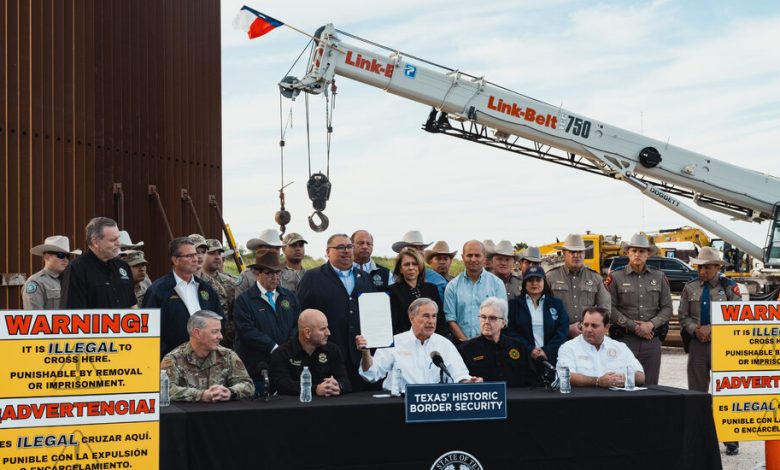Justice Dept. Threatens to Sue Texas Over Migrant Arrest Law

The Justice Department on Thursday threatened to sue Texas if it enforced a sweeping new law that would allow the state and local police to arrest migrants who enter the United States from Mexico without authorization, setting up the first significant legal showdown over federal immigration enforcement.
Gov. Greg Abbott of Texas signed the measure, known as Senate Bill 4, this month in his most direct challenge yet to the Biden administration’s handling of immigration. Immigrant-rights groups and Hispanic organizations had opposed the legislation, arguing that it would violate the U.S. Constitution and encourage racial profiling.
In a letter obtained by The New York Times, Brian M. Boynton, an assistant attorney general with the D.O.J., gave Mr. Abbott until next Wednesday to retract his intention to enforce the law, which takes effect in early March. Otherwise, he wrote, “the Department of Justice intends to bring a lawsuit to enforce the supremacy of federal law and to enjoin the operation of S.B. 4.”
In the letter, which was addressed to Mr. Abbott, a third-term Republican, and Ken Paxton, the state attorney general, Mr. Boynton cited a 2012 U.S. Supreme Court case, Arizona v. United States, in which the court narrowly decided in favor of the power of the federal government to set immigration policy.
“S.B. 4 therefore intrudes into a field that is occupied by the federal government and is pre-empted,” he wrote in the letter, which was first reported by The Houston Chronicle. “Indeed, the Supreme Court has confirmed that ‘the removal process’ must be ‘entrusted to the discretion of the federal government.’”
The legal threat came a day after Secretary of State Antony J. Blinken and other top American officials met with Mexico’s president, Manuel López Obrador, to discuss ways to slow illegal crossings, which have overwhelmed U.S. border towns and Democratic-run cities like New York, Chicago and Denver.
In recent weeks, the large number of migrants has also forced border officials to temporarily shut down several railway crossings in Texas and close the port of entry in Lukeville, Ariz., in order to redirect personnel and respond to hot spots.
The D.O.J.’s threat is one of several challenges to the Texas law. This month, El Paso County and two immigrant-rights groups, represented by the American Civil Liberties Union and the Texas Civil Rights Project, filed a lawsuit in an effort to halt the measure, echoing the Justice Department’s argument that immigration laws could be enforced only by federal agents.
That lawsuit, filed in federal court in Austin, names as defendants the Texas Department of Public Safety, whose officers would be tasked with arresting migrants, and the district attorney for El Paso County, Bill Hicks, whose office would file state charges.
Mr. Abbott has said that he was anticipating the legal challenges, and has made clear his intention to defend the law before the Supreme Court. On Thursday, a spokeswoman, Renae Eze, said state officials had no intention of following the Justice Department’s directive.
“President Biden’s deliberate and dangerous inaction at our southern border has left Texas to fend for itself,” she said in a statement.
Since 2021, Mr. Abbott has been testing the legal limits of what a state can do to enforce immigration law as part of a multibillion-dollar strategy known as Operation Lone Star, which has included the use of concertina wire and buoys along the banks of the Rio Grande.
He has also defended the need to arrest unauthorized migrants as a response to what he has called the failure of President Biden to control the southern border, where as many as 10,000 crossings have been recorded in a single day.
“In his absence, Texas has the constitutional authority to secure our border through historic laws like S.B. 4,” Mr. Abbott has said.
In his Thursday letter, Mr. Boynton expressed his intention to argue the merits of the state’s objections before the case reached a courtroom.
“To the extent you believe there are any facts or law supporting the validity of S.B. 4, we urge you to promptly bring them to our attention,” he wrote.




